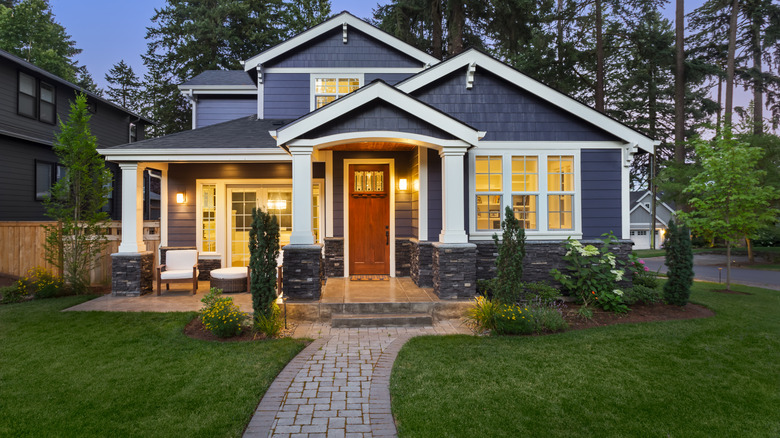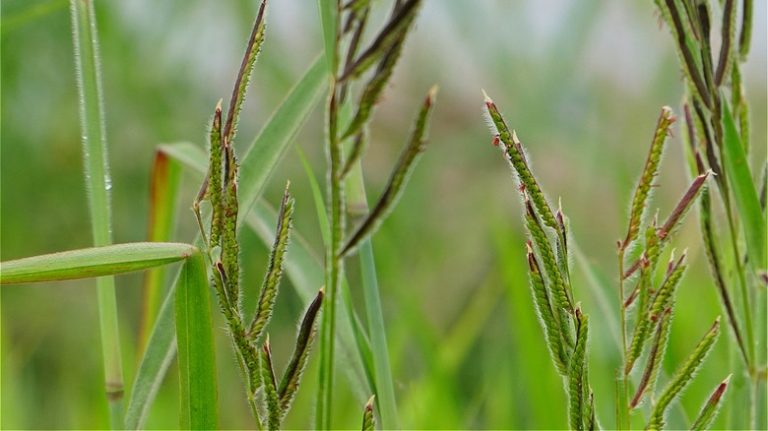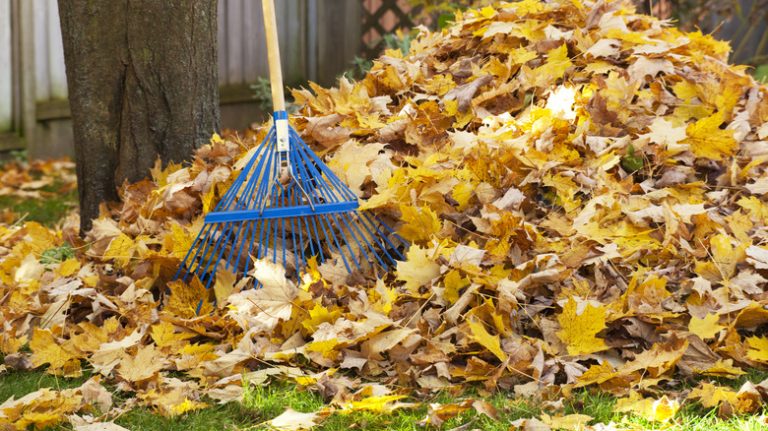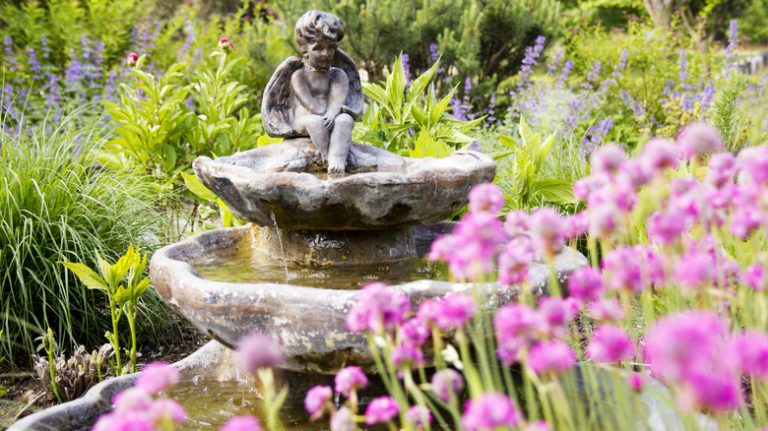Curb appeal not only elevates home value, but it’s also known to make potential buyers more eager to step inside and take a tour. Lawn care and landscaping are such a priority that, according to the National Association of Realtors, 74 percent of Realtors want to see a complete landscape maintenance program before listing a home. On the survey, Realtors gave top billing to the importance of using a lawn care service, estimating that homeowners would recoup 267 percent of their investment.
But don’t stop there, because homeowners can hope to recover 100 percent of landscaping and tree care costs when selling their house as well. Meanwhile, a fire feature, new wood deck or patio, irrigation system, and water feature all ranked high on the survey. So while the interior of your home at the time of sale may be your top concern, it’s wise to also consider what people see first: The property. But how do you get the most bang for your landscape buck?
Start with a plan

Want something to be successful? Then it’s best to create a plan. That’s especially true with your backyard, where harmony, not disorder, should rule. Jersey-Friendly Yards suggests getting to know your yard intimately with details like hours of direct sunlight, drainage issues, and direction of runoff. Look for patterns, like human and dog traffic, as these will affect what you can plant and where. Work all these details into a sketch, after taking an inventory of existing natural and manmade features, from trees and gardens to statues and pergolas.
You want to consider how the yard will function as part of your plan. Is it party central or a wildlife habitat, a family fun zone or an elegant English garden? Combine what you see with what you might have to dig into (like a soil sample) and you’re on the way to creating your dream yard while saving money by avoiding mistakes — like plants that won’t thrive in your location.
Trees: Beauty and shade
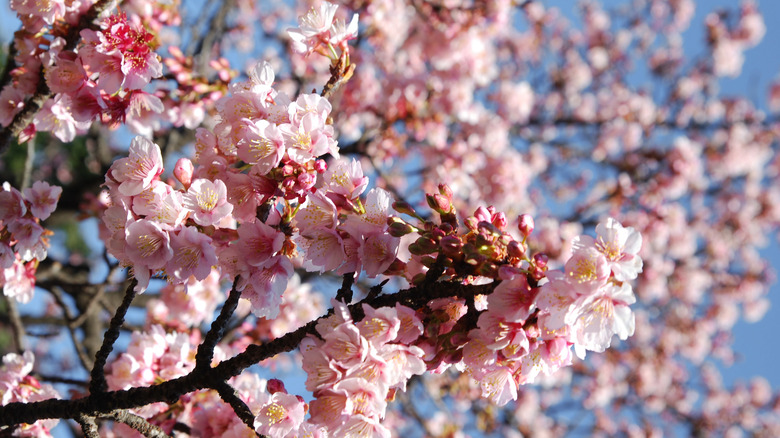
Lots of trees, lots of curb appeal. Well, not exactly. Cramped together trees won’t grow right. They may even succumb to disease without the proper sunlight and space. Too close to a property line, and you’ll have one angry neighbor. That’s why Jersey-Friendly Yards recommends getting to know how big a tree will get, both in height and width, before planting. While you’re at it, make sure that tree or shrub is a match for your growing conditions from sun to soil.
With their variety of foliage, flowers and sometimes fruit, trees can add color, interest and texture to the yard, creating year-round interest. Strategic placement can spotlight a beautiful tree like a flowering cherry. In the case of shrubs and bushes, creative configurations can capture the eye, and perhaps that of prospective buyers as well. Remember that shrubs and bushes are only a plus if cared for and trimmed.
Hardscaping
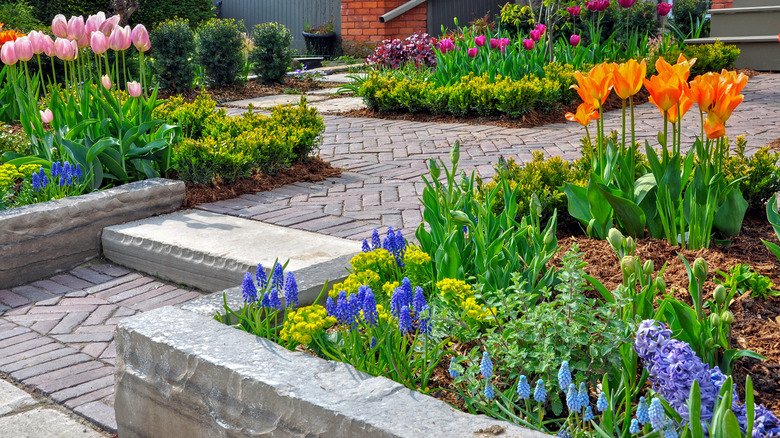
Joanne Dale/Shutterstock
The softer elements of your yard, such as the flowers, shrubs, trees, and grass, work best when contrasted with hardscaping — that’s your patios, walkways, retaining walls, paver edging for flowerbeds, and so on. Pennsylvania-based Woodward Landscaping Supply suggests that building one or more retaining walls is an affordable place to start your hardscaping initiative. Choose materials that fit your home’s character like natural stone, boulders, timber, or concrete blocks.
Retaining walls are more than pretty. See them as a tool to fight soil erosion and flooding and make a sloped yard usable for family fun. Additionally, for a big yard, retaining walls are a way to add height and dimension. With elevated flowerbeds built right in, they also beautify while enhancing property value. Paths can direct the flow of traffic through your landscape, helping you plan which areas you’d like to highlight and also making practical areas more accessible.
Landscape lighting
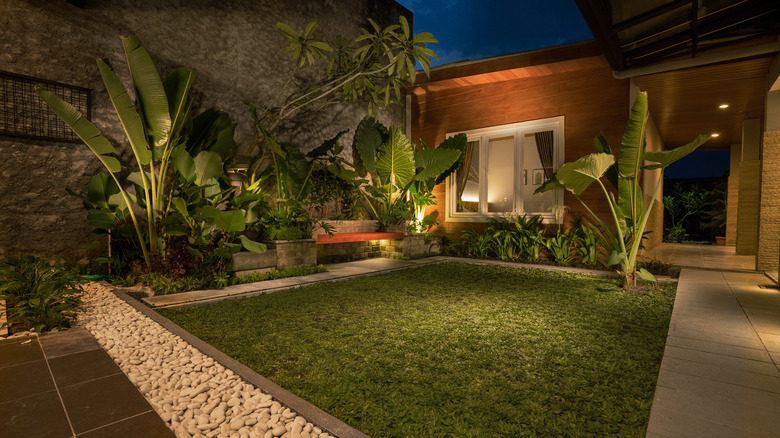
Odua Images/Shutterstock
Never come home to a dark house again. There are many ways to illuminate your yard for value, security, and just plain beauty. According to Premier Ponds & Lighting, a combination of fixtures will illuminate your yard for fun and festivities after sunset — from heavy hitters like spotlights and floodlights to mood-setting string lighting. Step lights make the deck stairs an easy climb after sundown, while bollard lights on posts are prized for their multi-directional approach. Spotlights can show off special features like statues, trees and possibly that koi pond as well.
In addition to different types of lights, there are a few lighting techniques that can really make your nighttime landscape shine (via Kichler Lighting). Wall wash and grazing lighting schemes, for example, both highlight the facade and texture of your home. Grazing is especially striking if your home is made of stone or brick. Good landscape lighting is both functional and beautiful.
Catch the eye with color
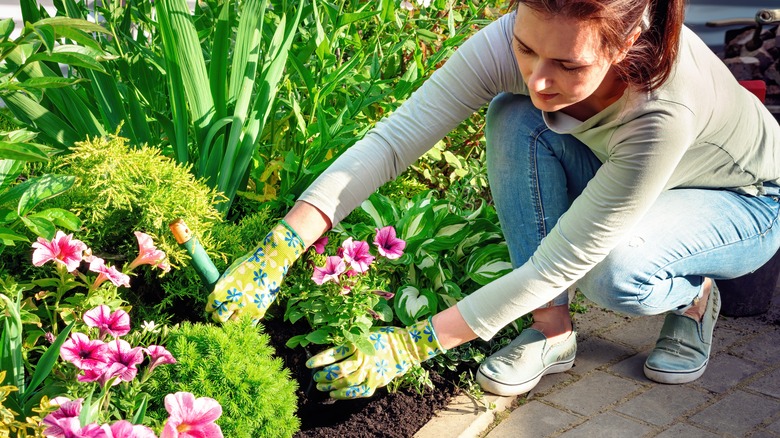
nieriss/Shutterstock
Bright bursts of color in the landscaping are bound to draw a home buyer’s attention. For max effect, aim to have blooms popping up each season, which means doing a little bit of research on what grows when in your region, says Garden Crossings. Foliage can also contribute both color and texture. Many use containers to enliven a front porch, deck or stairs. Azaleas, petunias, hydrangeas — all have a vibrant color story. Flowers can be planted in groups for extra drama or in rows with the tallest in back.
Whether in simple window boxes or flower beds perhaps encircling a fountain, they provide myriad opportunities to turn heads. Just make sure to test your soil and do your research before investing in flowers or shrubs. You want to make sure your flowers will support your design dream and keep their brilliant hues for a while.
Mulching
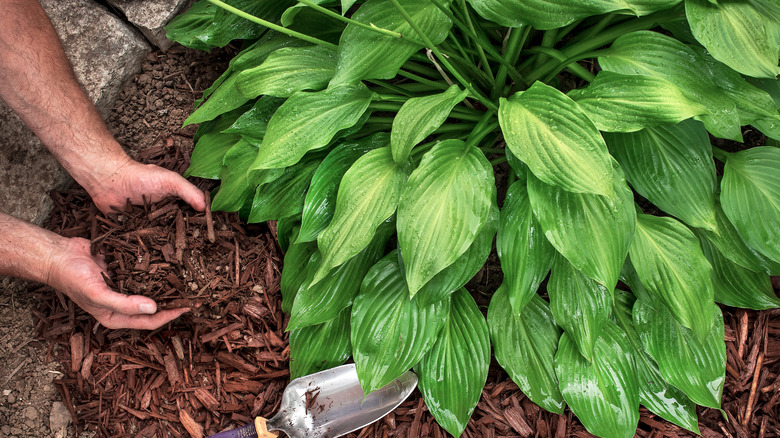
Jon Rehg/Shutterstock
Mulching does more than make a garden look fresh and neat. It cuts down on weeding. thereby reducing yard labor, retains moisture and nutrients…and is a cheap way to give your home a buy-me boost. Hyannis Garden Center has a few pointers for optimum results, such as not piling up mulch like a volcano around any trees and shrubs you want to keep. While any color mulch is effective (perhaps something matching the color of your house), the smaller pieces perform best for weed control.
Whenever you mulch, the rule is: Easy does it. Mulch should be applied in a layer no thicker than an inch or two. For the truly budget-conscious, leaves can be turned into mulch, but they will have to be cut first. While it’s best in terms of weed suppression to apply mulch in early spring, it can be done at any time of year.
Build a fire pit
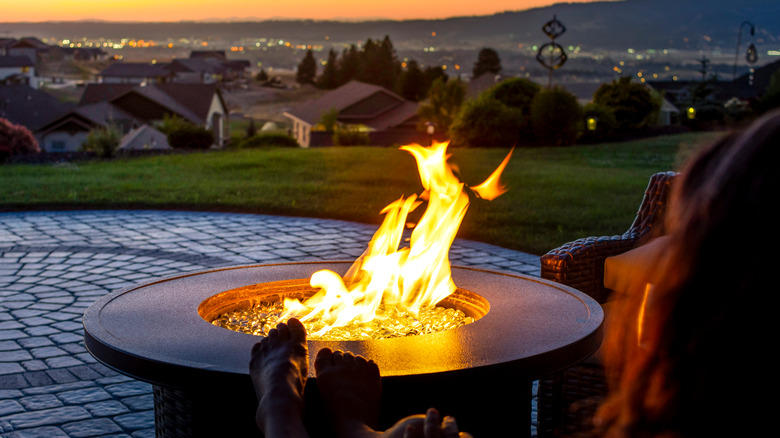
Kirk Fisher/Shutterstock
Zillow suggests that creating a fire pit is a major step toward year-round enjoyment of your yard, which buyers find attractive today. Gathering in the outdoors is toasty with a fire pit, even on cool nights in the spring, summer or fall. Fire pits have been known to enhance the value of a house some 2.8 percent, according to a Zillow study, and the whole family can have a part in creating one with simple materials. After all, everyone gets to toast smores and marshmallows for which fire pits are famous.
No time to build your own? No problem. There are many varieties available online in several sizes and styles, so you can find something that complements your yard perfectly. Just check first for compliance with city safety rules. And if you have your heart set on a custom version, it’s easy to find a contractor who can build you exactly what you want.
Build or fix a patio
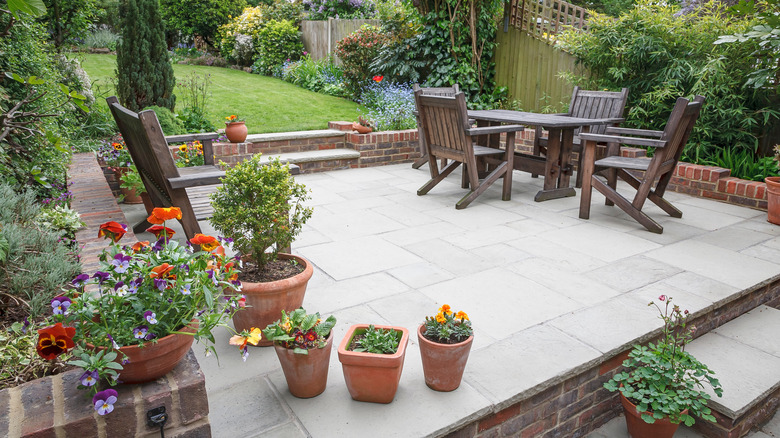
Paul Maguire/Shutterstock
Outdoor living areas were all the rage in 2024, and no doubt will continue to be a hit. Building, or better yet sprucing up your old patio for the greatest return on investment (ROI), can get the momentum going to transform the backyard from seldom used to entertainment central. A word of caution from Extra Space, however, is not to eat up too much outdoor space with just the patio since families also find plenty of use for green grass, gardens, and other amenities.
Extra Space estimated the ROI at over 80 percent for a new patio and almost 500 percent for improving an existing patio. Building a new patio can cost up to $5,000, and repairing an existing one can vary. Adding lighting and patio furniture can make the patio both more enjoyable for your family and give your landscape even more appeal for prospective buyers.
Allow for shade
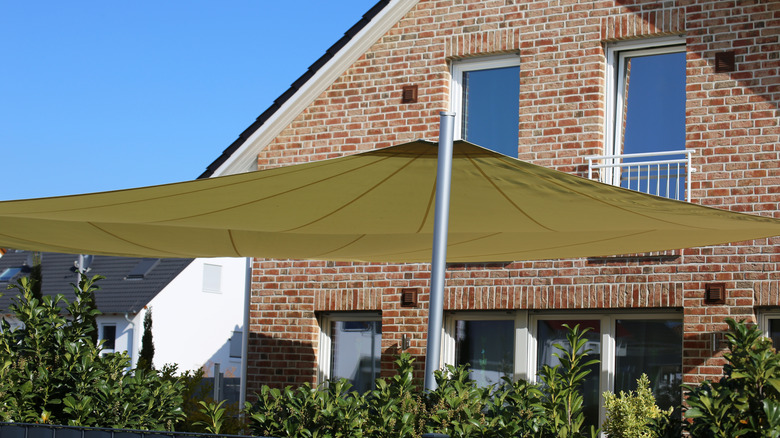
Palatinate Stock/Shutterstock
To go along with that patio, you’ll need shade or your guests will be the barbecue. Realty Times suggests instead of spending thousands, shop for an affordable pergola at a big-box store like Costco. Of course, pergolas only provide partial cover, so another cost-conscious option might be a shade sail. A shade sail is a trendy solution to summer heat, and DIYers can find how-to videos online to get them through the installation process. Available in various sizes to meet your needs and made of UV protective materials, they get the job done of expanding your outdoor living space without straining your budget.
For a quicker, less expensive option, classic patio umbrellas are a good choice (via Install It Direct). You can find free-standing models with weighted bases to move around wherever you need it, or models that can shade a patio table. They’re available in several colors and patterns to fit in with your external decor.
Green grass rules
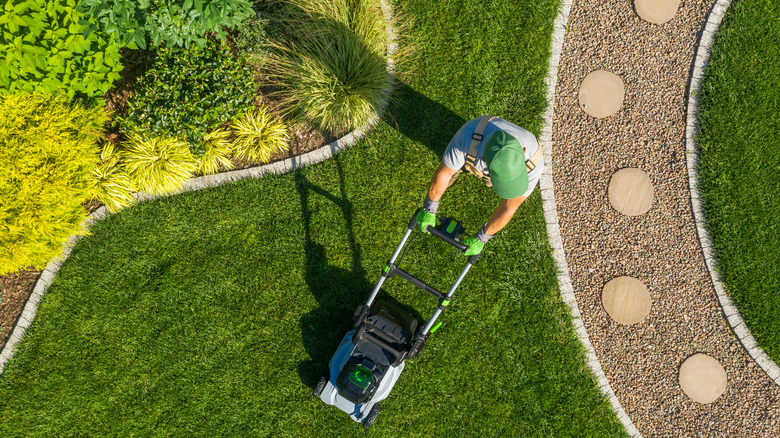
Virrage Images/Shutterstock
Well-manicured lawns are lots of work, from weeding to fertilizing, but in suburbia, anything less detracts from home’s value. But it’s not as simple as just laying down some seed and expecting a lush, green carpet. Pennington Seed says it’s important to first test the soil, measure your yard to get enough seed, and then match the seed to your climate and region. For instance, Kentucky bluegrass is meant for northern zones and Bermuda grass for warmer climates. For greatest success, plant at the optimum time of the year, which is typically fall, and don’t add weed killer until you have a lawn.
To keep the lawn lush and green even in the heat of summer, Landscape East recommends mowing high, watering early in the day, and watering on a regular schedule, being sure to water deeply when you do. They also recommend fertilizing your lawn every six weeks during the growing season.
Spruce up your deck
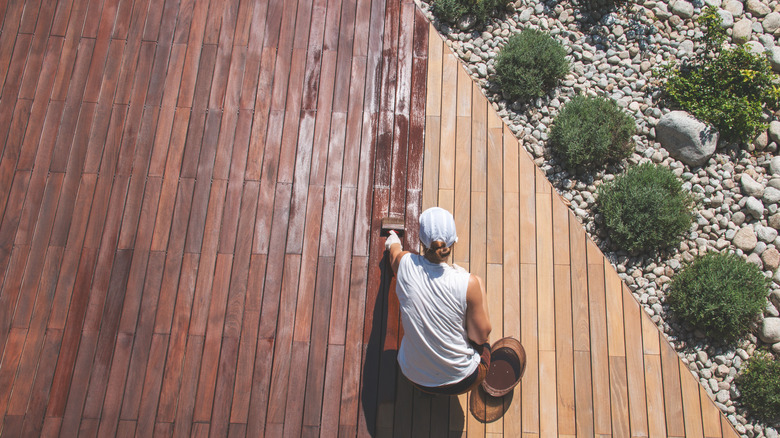
Radoslav Cajkovic/Shutterstock
Take the time to clean, seal, or otherwise freshen your deck so that it’s a selling point and the center of backyard fun. When splintered, uneven, and stained, a deck will be no man’s land. According to New York-based GNH Lumber Inc., decks should be inspected regularly, especially at connections with the ground or house, and repairs made, including cosmetic fixes like hammering in popped nails. To look their best, wood decks need a good periodic scrub-down with a bristle brush and a wash solution, but more stubborn stains or sun-damage may require a pressure washer.
The next step is sanding after the deck has dried thoroughly, and lastly, applying a stain to preserve the deck. A semitransparent stain will work best with older wood, while newer decks do fine with a transparent stain. Wash, repair, and seal your deck regularly to help it last longer and keep it looking its best.
Well-functioning irrigation system
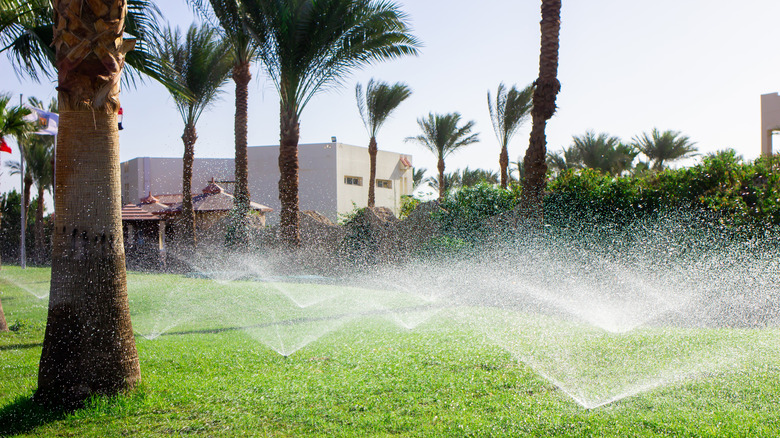
While not directly increasing a home’s value, a well-functioning irrigation system will keep the lawn looking its best even when you’re on vacation, and as previously mentioned, green grass is a buyer’s priority these days. Buyers only find an irrigation system a plus if it gets the job done without headaches, however. To truly make lawn watering a snap, Horticulture Services in Michigan says folks might look for smart controllers to run the irrigation only on dry days. Especially in areas where water use is limited, also consider rain sensors to conserve by regulating the irrigation based on precipitation going back to the previous day, the lawn maintenance firm says.
Effective irrigation systems are set up in zones that ensure that all areas of the lawn receive water, and that as little as possible goes to waste. Spray heads and rotor covers pop up to provide a larger area of irrigation, while drip lines can be installed to water specific plants.
Easy maintenance
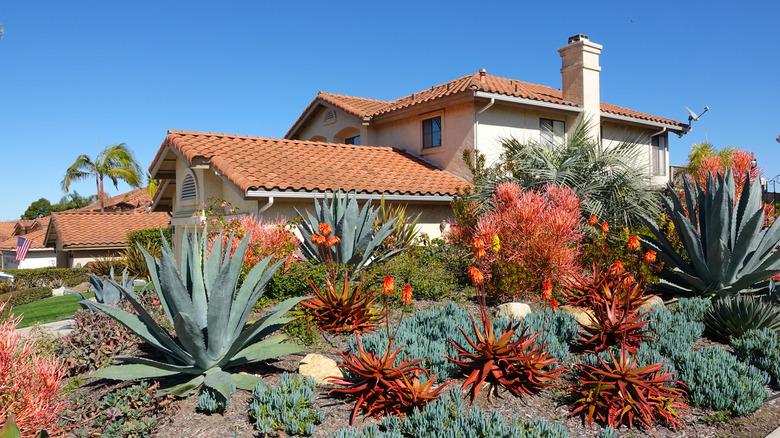
Simone Hogan/Shutterstock
Even with irrigation systems, not everyone has the time to devote to caring for a yard and lawn. That’s why a low-maintenance alternative to lawns can draw busy buyers, especially in regions with sandy soil. In drought-prone areas, like California, there may not be enough water to give a new lawn what it needs to survive. Instead of constantly battling to revive burnt spots, My Garden Life offers an alternative: A garden of cacti and succulents like agave and aloe.
Bonus: This creates a western vibe while relieving new homeowners of the time-consuming hassle of lawn care. Another low-maintenance option might be a wildflower meadow, sustained only by rainwater. You could also consider a Japanese garden with lots of pebbles, seating, statuary, and low-maintenance plants. No matter which style suits you best, all of these options are drought-tolerant and low-care, which can be very attractive to busy homeowners.

